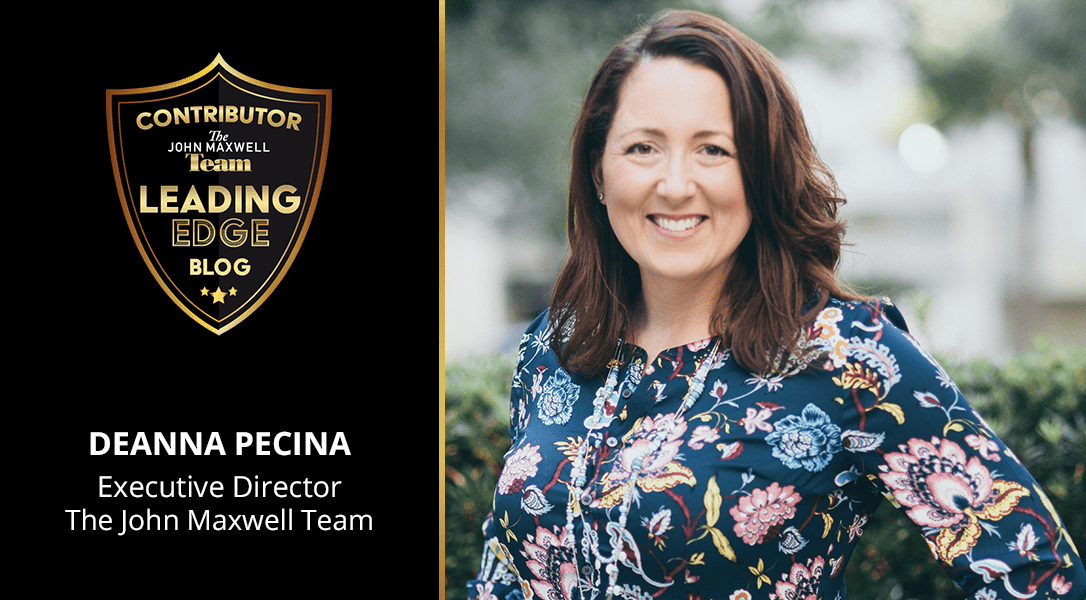The Leading Edge: A Teacher’s Heart The Door to Connection, Communication and Interaction

By: Deanna Pecina
From the start of my career, knowing my students was a priority for me. I loved my students like my own and valued the relationships that I had– and, in many cases, still have– with them. I cared deeply for my “kids” and worked diligently to connect with them as individuals.
The first time I read the following three questions in Chapter 2 of Everyone Communicates, Few Connect, it was as if my teaching philosophy had been wrapped up with a big red bow:
- Do you care for me?
- Can you help me?
- Can I trust you?
Throughout my years as a teacher, my number one priority was to connect with my students as people, not as 7th graders or 9th graders, but as people with hopes and a desire for their future. It was of the utmost importance to me to see into my students for their potential and all they would become.
It is my philosophy that the ability to connect is the single most essential skill a teacher can possess. If you are an expert in your subject but can’t connect with your students, you won’t be able to reach them. And, in the world that we live in, connecting with students and cultivating relationships could not be more important than it is now.
See, teaching isn’t about the teacher. It’s about the student. As John C. Maxwell states in Everyone Communicates Few Connect, “Good teachers, leaders, and speakers don’t see themselves as experts with passive audiences they need to impress. Nor do they view their interests as more important. Instead, they see themselves as guides and focus on helping others learn.”
If teachers don’t approach students with a heart of service and a genuine desire to help guide them to become the best versions of themselves, then their students won’t trust them.
If they don’t trust you, they surely will not work to their potential while they are within your care.
If we think of the word care from the first question in terms of protection of someone or something, the teaching relationship becomes a sacred bond. While students are in our care, it is our duty to look after them and ensure their needs are met.
This doesn’t mean that it’s our job to shield them from failure or the world in general. Quite the opposite! It is the teacher’s responsibility to create an environment of trust, allowing students to push themselves to explore new ideas, discover new ways of seeing the world, and to move ever closer to who they are in the process of becoming.
When I think about connections with students, I think back many times to a student of mine who was a Kosovar refugee. He showed up to my classroom the first week of school with nothing but the clothes on his back. He spoke no English, and I did not speak his native language, Albanian. This was before the days of Google and instant internet information. Yet, over the course of a school year, we developed a bond that stays with me today.
He slowly learned English. His family would invite me to their home for dinner. I loved going to their home to learn more about their culture and enjoy hot tea and fresh baked bread.
The year after I taught him, he and his siblings came to welcome my husband home from a military deployment. I’ll never forget the sounds of “I’m Proud to Be an American” playing in the distance with them by my side while helicopters flew overhead with returning Marines on board.
And, to this day, we stay in touch. Why? Because I cared for him, because I helped him, and because he could trust me. Relationships like these are something I will never take for granted.
In many ways, teaching is like building a pyramid. Brick by brick, the stones are laid. We may encounter our students when they are at the base of the pyramid looking up, feeling as if they’ll never reach the top. We work with them to create a solid foundation, knowing most of the time we will never see the finished product. Or, we may be lucky enough to encounter them halfway up and enjoy with them the view of how far they have come and how much closer they are to reaching their goals. On rare occasions, we get a glimpse of the “finished” product, knowing that we played but a small part in their journey.
I am thankful to John C. Maxwell and his Everyone Communicates Few Connect for the reminder and affirmation that “whenever you can help other people to understand that you genuinely care about them, you open up the door to connection, communication, and interaction.”
Deanna Pecina is the CEO of Pecina Solutions, LLC, and serves as an Executive Director on the John Maxwell Team as a certified coach, trainer and speaker. Deanna is a parenting educator who focuses on mindset, communication, and positive solutions to enable overwhelmed parents to learn to parent with purpose, not perfection. She focus on R.E.A.L. solutions that allow parents to Relate, Empathize, Affirm, and Lead their children. She has a special passion for parents of middle school children. Deanna holds a Master’s degree in Humanities from California State University, Dominguez Hills, and a Master’s of School Administration from East Carolina University. She was also a National Board Certified Teacher. Deanna has accumulated over 25 years of education experience at all grade levels to include classroom teaching and school administration. She has an entrepreneurial spirit, and empowering parents to lead their families is her passion. Her motto is “Real Parents. Real Solutions.” Learn more about Deanna at www.deannapecina.com.
